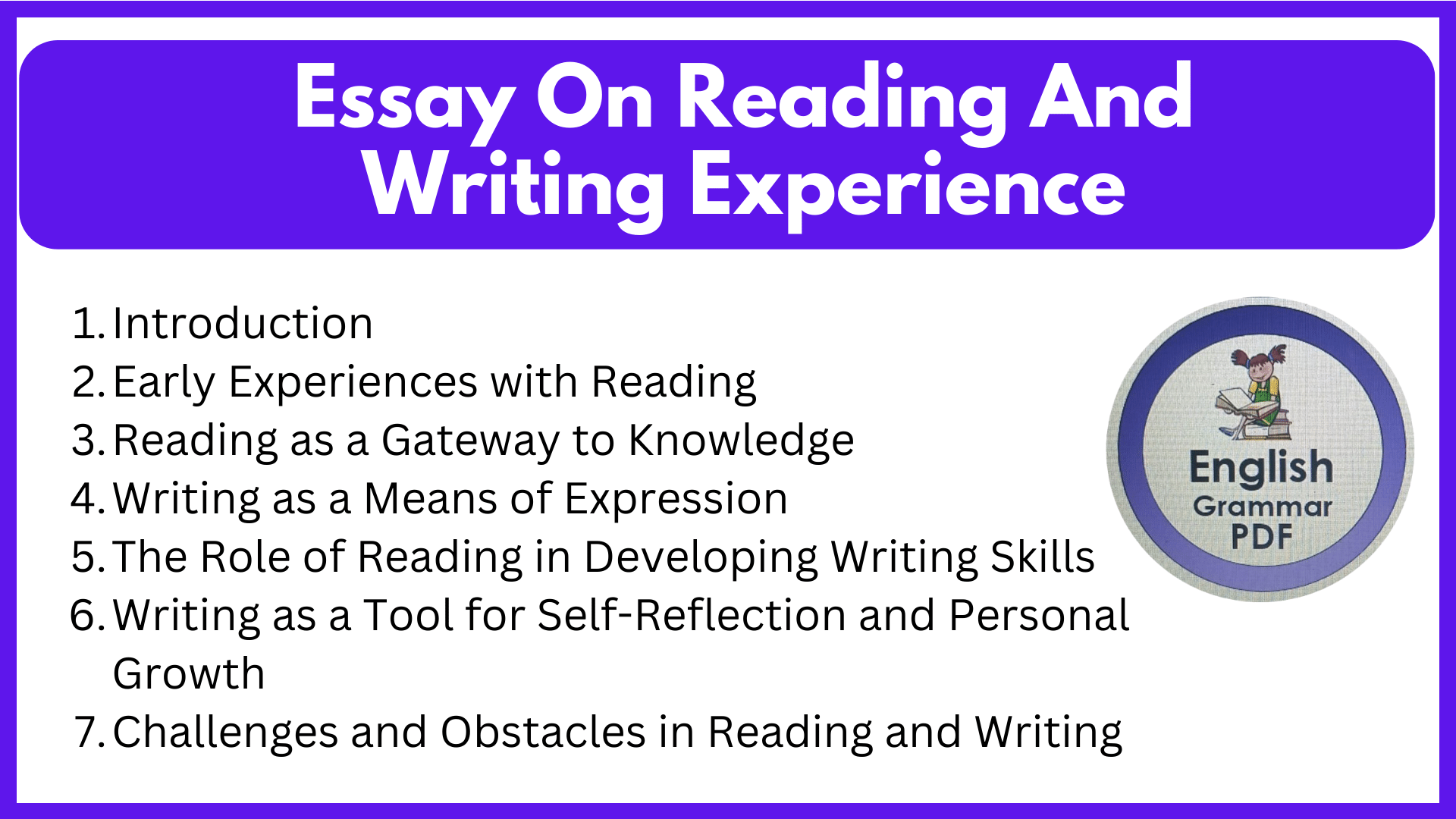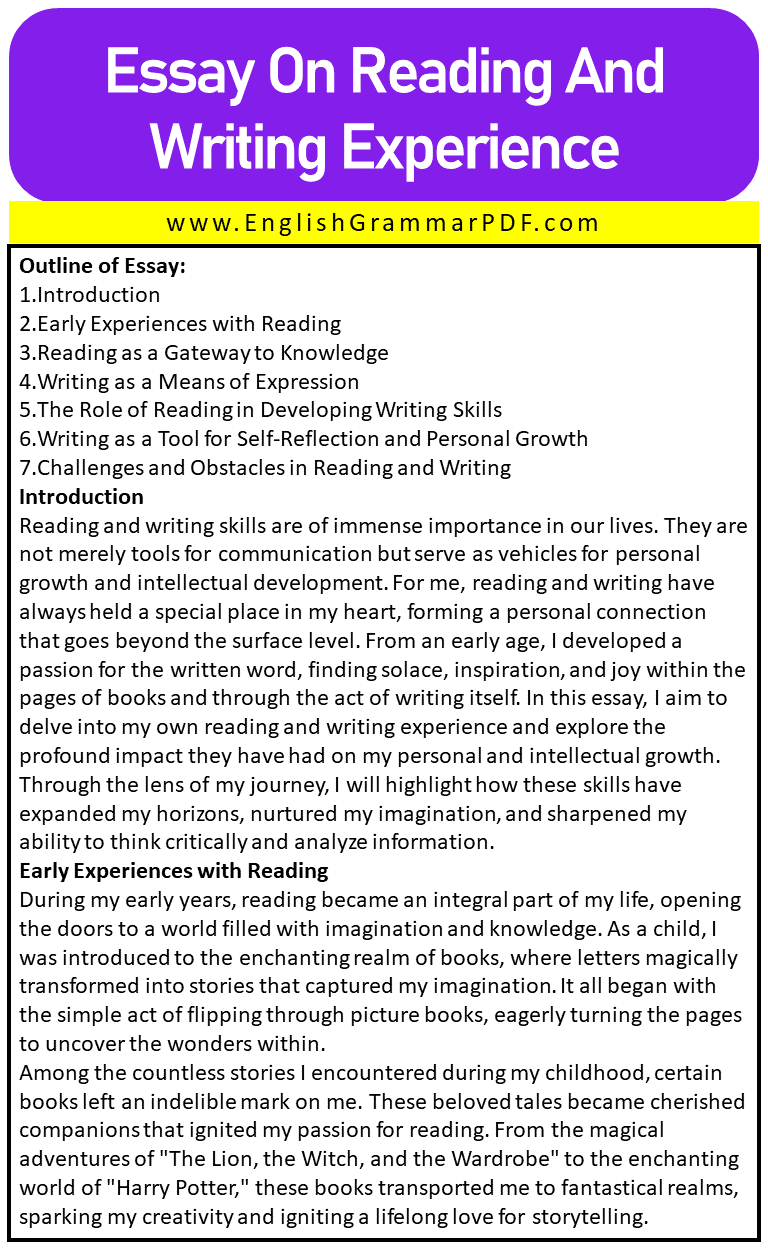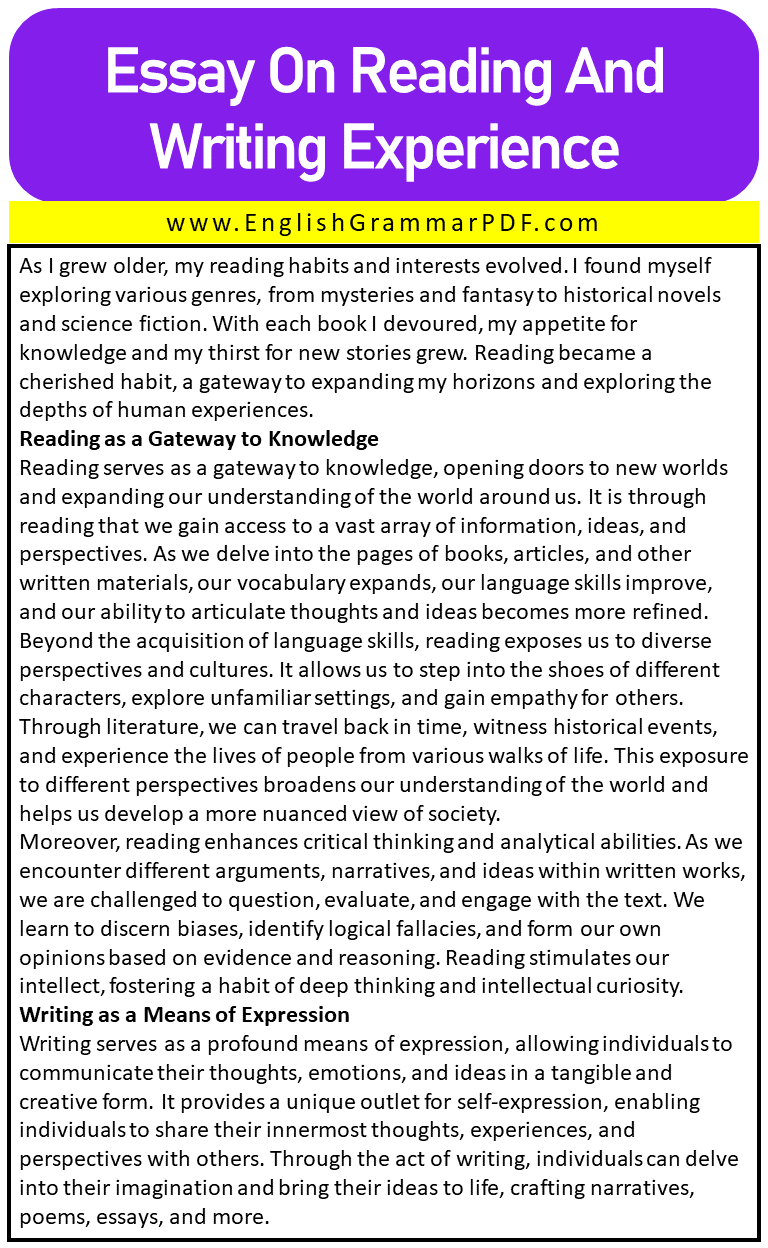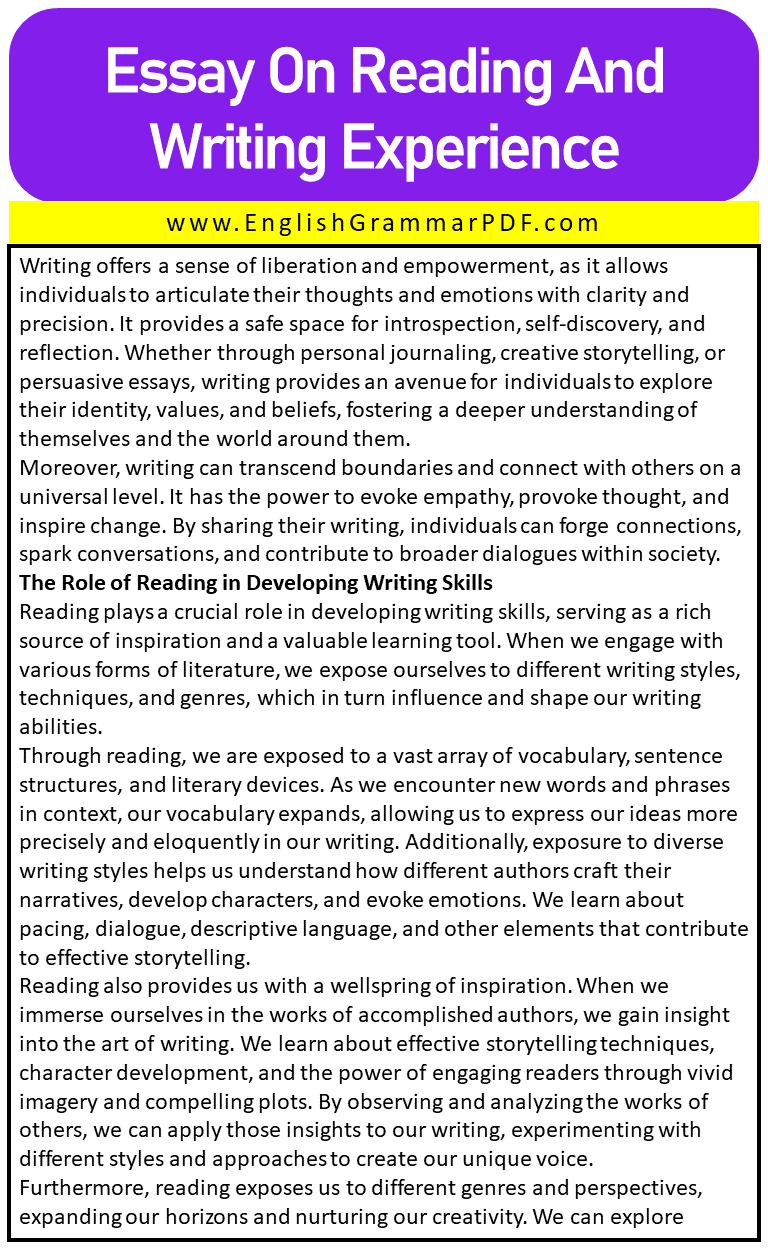Essay On Reading And Writing Experience
Outline of Essay:
- Introduction
- Early Experiences with Reading
- Reading as a Gateway to Knowledge
- Writing as a Means of Expression
- The Role of Reading in Developing Writing Skills
- Writing as a Tool for Self-Reflection and Personal Growth
- Challenges and Obstacles in Reading and Writing
Introduction
Reading and writing skills are of immense importance in our lives. They are not merely tools for communication but serve as vehicles for personal growth and intellectual development. For me, reading and writing have always held a special place in my heart, forming a personal connection that goes beyond the surface level. From an early age, I developed a passion for the written word, finding solace, inspiration, and joy within the pages of books and through the act of writing itself. In this essay, I aim to delve into my own reading and writing experience and explore the profound impact they have had on my personal and intellectual growth. Through the lens of my journey, I will highlight how these skills have expanded my horizons, nurtured my imagination, and sharpened my ability to think critically and analyze information.
Early Experiences with Reading
During my early years, reading became an integral part of my life, opening the doors to a world filled with imagination and knowledge. As a child, I was introduced to the enchanting realm of books, where letters magically transformed into stories that captured my imagination. It all began with the simple act of flipping through picture books, eagerly turning the pages to uncover the wonders within.
Among the countless stories I encountered during my childhood, certain books left an indelible mark on me. These beloved tales became cherished companions that ignited my passion for reading. From the magical adventures of “The Lion, the Witch, and the Wardrobe” to the enchanting world of “Harry Potter,” these books transported me to fantastical realms, sparking my creativity and igniting a lifelong love for storytelling.
As I grew older, my reading habits and interests evolved. I found myself exploring various genres, from mysteries and fantasy to historical novels and science fiction. With each book I devoured, my appetite for knowledge and my thirst for new stories grew. Reading became a cherished habit, a gateway to expanding my horizons and exploring the depths of human experiences.
Reading as a Gateway to Knowledge
Reading serves as a gateway to knowledge, opening doors to new worlds and expanding our understanding of the world around us. It is through reading that we gain access to a vast array of information, ideas, and perspectives. As we delve into the pages of books, articles, and other written materials, our vocabulary expands, our language skills improve, and our ability to articulate thoughts and ideas becomes more refined.
Beyond the acquisition of language skills, reading exposes us to diverse perspectives and cultures. It allows us to step into the shoes of different characters, explore unfamiliar settings, and gain empathy for others. Through literature, we can travel back in time, witness historical events, and experience the lives of people from various walks of life. This exposure to different perspectives broadens our understanding of the world and helps us develop a more nuanced view of society.
Moreover, reading enhances critical thinking and analytical abilities. As we encounter different arguments, narratives, and ideas within written works, we are challenged to question, evaluate, and engage with the text. We learn to discern biases, identify logical fallacies, and form our own opinions based on evidence and reasoning. Reading stimulates our intellect, fostering a habit of deep thinking and intellectual curiosity.
Writing as a Means of Expression
Writing serves as a profound means of expression, allowing individuals to communicate their thoughts, emotions, and ideas in a tangible and creative form. It provides a unique outlet for self-expression, enabling individuals to share their innermost thoughts, experiences, and perspectives with others. Through the act of writing, individuals can delve into their imagination and bring their ideas to life, crafting narratives, poems, essays, and more.
Writing offers a sense of liberation and empowerment, as it allows individuals to articulate their thoughts and emotions with clarity and precision. It provides a safe space for introspection, self-discovery, and reflection. Whether through personal journaling, creative storytelling, or persuasive essays, writing provides an avenue for individuals to explore their identity, values, and beliefs, fostering a deeper understanding of themselves and the world around them.
Moreover, writing can transcend boundaries and connect with others on a universal level. It has the power to evoke empathy, provoke thought, and inspire change. By sharing their writing, individuals can forge connections, spark conversations, and contribute to broader dialogues within society.
The Role of Reading in Developing Writing Skills
Reading plays a crucial role in developing writing skills, serving as a rich source of inspiration and a valuable learning tool. When we engage with various forms of literature, we expose ourselves to different writing styles, techniques, and genres, which in turn influence and shape our writing abilities.
Through reading, we are exposed to a vast array of vocabulary, sentence structures, and literary devices. As we encounter new words and phrases in context, our vocabulary expands, allowing us to express our ideas more precisely and eloquently in our writing. Additionally, exposure to diverse writing styles helps us understand how different authors craft their narratives, develop characters, and evoke emotions. We learn about pacing, dialogue, descriptive language, and other elements that contribute to effective storytelling.
Reading also provides us with a wellspring of inspiration. When we immerse ourselves in the works of accomplished authors, we gain insight into the art of writing. We learn about effective storytelling techniques, character development, and the power of engaging readers through vivid imagery and compelling plots. By observing and analyzing the works of others, we can apply those insights to our writing, experimenting with different styles and approaches to create our unique voice.
Furthermore, reading exposes us to different genres and perspectives, expanding our horizons and nurturing our creativity. We can explore the realms of science fiction, historical fiction, fantasy, non-fiction, and more, which broadens our understanding of the world and enhances our ability to convey diverse ideas and experiences through our writing.
Writing as a Tool for Self-Reflection and Personal Growth
Writing serves as an invaluable tool for self-reflection and personal growth. Whether through journaling, personal essays, or creative writing, the act of putting thoughts and emotions onto paper allows for deeper exploration and understanding of oneself. Writing provides a safe and private space to express innermost thoughts, untangle complex emotions, and gain clarity about personal experiences.
Through writing, individuals can delve into their narratives, analyze past events, and contemplate their significance. It enables introspection and self-examination, allowing individuals to confront their fears, confront their strengths, and confront their vulnerabilities. By examining one’s thoughts and feelings through writing, patterns, and themes may emerge, leading to greater self-awareness and personal growth.
Moreover, writing fosters the development of self-confidence and self-expression. As individuals articulate their ideas and emotions on paper, they refine their ability to communicate effectively. Writing empowers individuals to find their unique voice, enabling them to convey their thoughts and experiences with authenticity and clarity. This process of self-expression can boost self-esteem and encourage personal growth, as individuals gain confidence in their ability to articulate their perspectives and connect with others through their writing.
Challenges and Obstacles in Reading and Writing
Reading and writing, while immensely rewarding, are not without their fair share of challenges and obstacles. For many individuals, one of the most common hurdles is overcoming writer’s block or creative slumps. The blank page can be intimidating, and finding the right words to express thoughts and ideas can be a daunting task. It requires perseverance, discipline, and the ability to push through the initial resistance.
Handling criticism and rejection is another challenge that writers often face. Putting one’s work out into the world opens it up to evaluation, and not everyone will respond positively. Dealing with negative feedback or rejection requires a resilient mindset and the willingness to learn and grow from constructive criticism.
Moreover, maintaining motivation and perseverance in the face of distractions and competing priorities can be a challenge. Life’s demands can make it difficult to find dedicated time for reading and writing, leading to inconsistent habits and progress. Developing strategies to stay focused and committed, such as setting achievable goals and creating a conducive environment, becomes crucial.
FAQ’s
What are the benefits of reading and writing to a student?
Reading and writing provide numerous benefits to students. They enhance language skills, expand vocabulary, improve critical thinking, foster creativity, and promote intellectual growth. Additionally, reading and writing help students express themselves effectively and succeed academically.
Why should students read and write every day?
Daily reading and writing have several advantages for students. They develop stronger reading comprehension skills, increase knowledge and understanding, boost vocabulary, improve writing proficiency, enhance communication skills, and foster a lifelong love for learning and self-expression.
Explore More Essays:
Download the PDF of the Essay:








